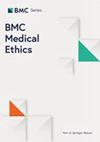What do suicide loss survivors think of physician-assisted suicide: a comparative analysis of suicide loss survivors and the general population in Germany
IF 3
1区 哲学
Q1 ETHICS
引用次数: 0
Abstract
Physician-assisted suicide (PAS) and voluntary euthanasia remain highly debated topics in society, drawing attention due to their ethical, legal, and emotional complexities. Within this debate, the loss of a loved one through suicide may shape the attitudes of survivors, resulting in more or less favorable attitudes towards this topic. This study aims to explore and compare the attitudes towards PAS and voluntary euthanasia in a population of suicide loss survivors and the general population, while also considering socio-demographic factors. A total of 529 participants, 168 of whom were survivors of suicide loss, completed an online questionnaire on their attitudes (NOBAS) and opinions (open response format) towards PAS and voluntary euthanasia, as well as regarding their legalization in Germany. The analysis consisted of both quantitative and qualitative components. The entire sample showed positive attitudes towards PAS and voluntary euthanasia in terminally ill persons. Participants were more divided in their attitudes towards PAS in the case of a mental health disorder. Individuals without experienced suicide loss were more liberal regarding legalization in Germany and were more likely to understand the wish for PAS. Survivors of suicide loss were mainly concerned about the consequences for relatives. However, differences between both groups are small. The experience of a loss by suicide influences attitudes towards PAS and voluntary euthanasia. Both groups showed an accepting attitude towards PAS and voluntary euthanasia, but also expressed concerns and fears regarding easy accessibility and consequences for grieving relatives.自杀幸存者如何看待医生协助自杀:对德国自杀幸存者和普通民众的比较分析
医生协助自杀(PAS)和自愿安乐死仍然是社会上备受争议的话题,因其在伦理、法律和情感方面的复杂性而备受关注。在这场辩论中,因自杀而失去亲人的经历可能会影响幸存者的态度,从而导致他们对这一话题持或多或少的赞成态度。本研究旨在探讨和比较自杀丧亲幸存者和普通人群对临终关怀和自愿安乐死的态度,同时考虑社会人口因素。共有 529 名参与者(其中 168 人是自杀幸存者)填写了一份在线问卷,内容涉及他们对德国允许自杀和自愿安乐死及其合法化的态度(NOBAS)和观点(开放式回答格式)。分析包括定量和定性两个部分。所有样本都对临终病人的临时安乐死和自愿安乐死持积极态度。对于精神疾病患者,参与者的态度较为分歧。没有自杀经历的人对德国的自杀合法化持更开明的态度,也更容易理解安乐死的愿望。有过自杀经历的幸存者则主要担心会对亲属造成影响。然而,这两个群体之间的差异很小。自杀丧生的经历会影响人们对临终关怀和自愿安乐死的态度。两组人都对临终关怀和自愿安乐死持接受态度,但也表达了对容易获得性和给悲伤的亲属带来的后果的担忧和恐惧。
本文章由计算机程序翻译,如有差异,请以英文原文为准。
求助全文
约1分钟内获得全文
求助全文
来源期刊

BMC Medical Ethics
MEDICAL ETHICS-
CiteScore
5.20
自引率
7.40%
发文量
108
审稿时长
>12 weeks
期刊介绍:
BMC Medical Ethics is an open access journal publishing original peer-reviewed research articles in relation to the ethical aspects of biomedical research and clinical practice, including professional choices and conduct, medical technologies, healthcare systems and health policies.
 求助内容:
求助内容: 应助结果提醒方式:
应助结果提醒方式:


